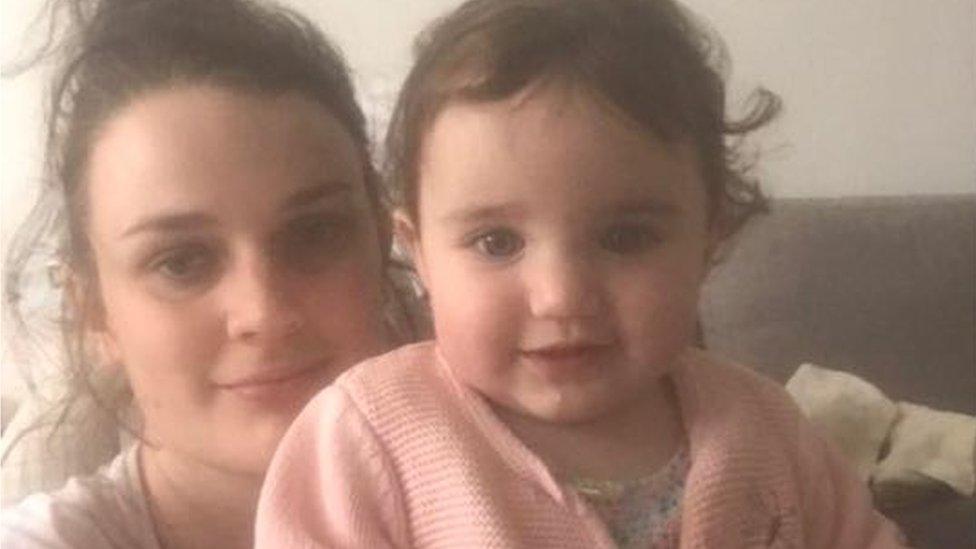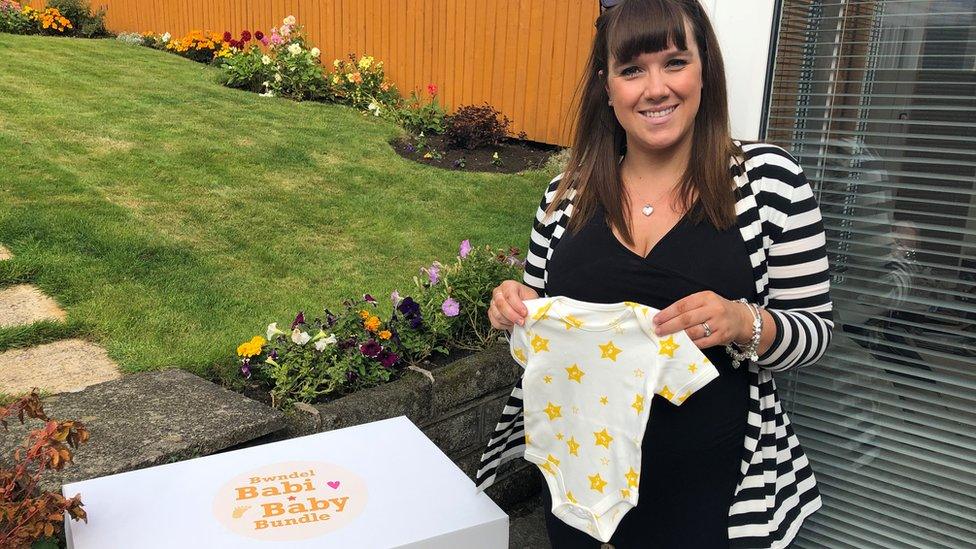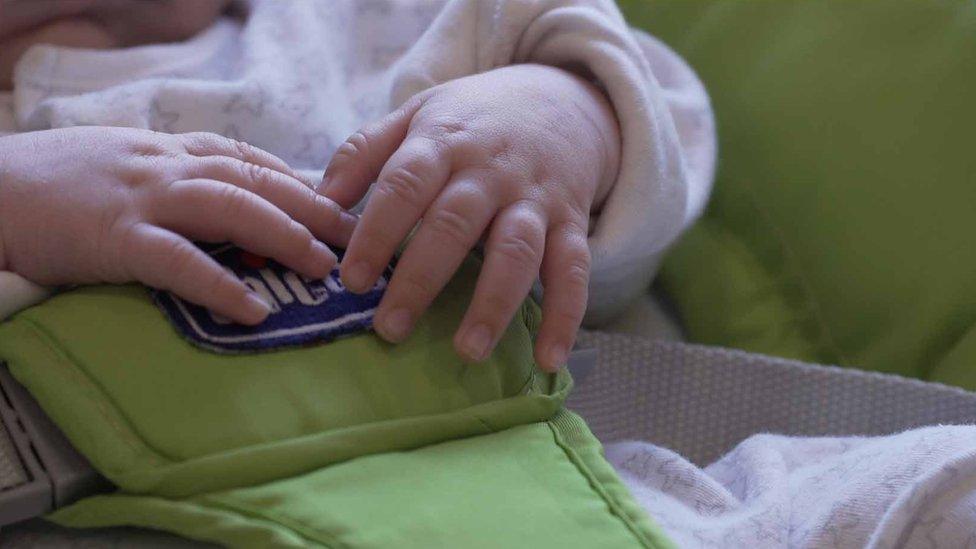Reflux: Babies 'in agony' and parents feeling 'ignored'
- Published

Parents say an adult would not be left in pain the way they claim their babies have been
Parents of babies suffering from acid reflux say they do not feel they are taken seriously when trying to seek help.
About 40% of babies experience reflux, external, with 90% growing out of the condition by the age of one and it does not usually cause discomfort.
However, some can experience pain, discomfort and trouble gaining weight.
"She cried 18 hours a day," Sophie Edwards said of her baby Luna, who was born in April during lockdown.
"It not only was a traumatic birth but what followed has been just as traumatic," Sophie, from Wrexham, said.
Sophie described Luna as an "angry, sad and screaming little baby" until she was four months old when doctors prescribed heart burn medication and a special formula milk.
"One midwife told me I just had an 'irritable baby' and that I was 'tired'. Another health visitor over the telephone told us to try her back on normal formula and plough on through."
Betsi Cadwaladr University Health Board said it was working to follow the guidelines during the pandemic, and to support patients and families as much as it could.
Alison Cowell, assistant area director for children's services, said: "As a result of the guidance, all patients are risk-assessed and any child or family where a face-to-face appointment is deemed essential, can receive one.
"If a parent was concerned about their child's feeding and if not resolved over time through telephone advice and the concerns persist, a face-to face-appointment would be made and the baby weighed."
Sophie is not alone in her experience, with parents on a Facebook support group saying they feel "ignored" when trying to get help.
"My doctor prescribed sleeping tablets and anti-depressants for me - because my baby didn't sleep," one mother said, with another adding: "The lack of support, and general understanding by doctors, including paediatricians, is shocking."
Another parent said: "I was terrified he was going to die if I wasn't watching him. At six months, he vomited blood and we took him to A&E. His throat was compared to an alcoholic's. It was so raw the acid had literally burned it and caused a blood vessel to break."
Dr Eilir Hughes, a GP in Gwynedd, said good communication between a patient and medical professional was imperative, and studies have shown parents who report excessive crying do often score higher on depression scores so it is important they were listened to.

Fiona George Williams says she relied on Google and support groups to find ways to help Violet
Fiona George Williams, 33, from Swansea, said her baby Violet was "gagging, choking and crying all the time and was always congested".
Violet gained weight but slowly, and was prescribed a different milk, in case she was suffering from a cow's milk allergy, and heart burn medication.
"At her last injections, she had dropped weight drastically so they admitted us to paediatrics... when he checked her weight it seemed she was never losing weight they had just plotted her wrong on chart," Fiona said.
'A nightmare for nine months'
She added while she felt medical professionals had taken her seriously, she took it upon herself to research via Google and support groups what could have been causing Violet's problems.
"I just knew something wasn't right. I was constantly watching and taking in everything Violet was doing and when.
"I went to the doctors saying 'I think it's this or that', gave all my reasons and they went with it.
"Mums know when there is something just not right. The amount of times I've heard 'it's all trial and error' - who wants any errors regarding a baby?"
Geraint Morris, consultant neonatologist and service lead at Swansea Bay health board, said: "We are very sorry to hear of Ms Williams' concerns.
"Although we cannot comment on individual cases without consent, we would be happy to discuss those concerns with her directly.
"Generally speaking, gastro-oesophageal reflux is a common condition in babies and can be very troublesome to them and challenging for their parents.
"While treatment options are limited, it is generally a condition that improves with age - though severe cases may need more specialist management."
Rachel Davies, 28, said she'd had a "nightmare for nine months" - with one paediatrician suggesting her baby was crying all the time because she was "bored".

Rachel Davies said her daughter was in pain for nine months but one doctor suggested she may just be "bored"
"I wasn't taken seriously," she said.
Ms Davies' daughter had silent reflux - where milk is brought up but swallowed back down again, with the stomach acid causing irritation in the throat.
"She was never sick much, just screamed every second of the day and night.
"I must have gone to the doctors at least once a week as she was in constant pain, nothing I was doing was working.
"The paediatric doctor told me she was bored at five months, but realised after half-an-hour of screaming she wasn't bored."
'They wouldn't leave an adult in pain, so why a baby?'
Ms Davies, from Pontypridd, said three different medications were tried, along with different formula milks and baby massage.
"Lockdown then happened and I begged to see the doctor as she was in pain all the time. She told me as it was lockdown she couldn't have her stay in the hospital to do some tests so we were basically sent home with nothing and just told put up with it.
"I had a two-year-old to look after too while my boyfriend worked full-time.
"It was pure hell. Eventually after nine months of constant screaming she settled a lot."
Ms Davies believes reflux also affected her daughter's development, as she would begin to crawl when the condition settled and stop again when it flared.
"How there isn't more help for reflux babies, I do not know," she said.
"They wouldn't let an adult be in that much pain, so why such a young baby?"
Cwm Taf Morgannwg health board said its clinicians followed national guidance on deciding a course of treatment or management of acid reflux in babies.
"While we cannot comment on individual cases, we understand that the symptoms of acid reflux can be distressing to babies and parents and sympathise with them."
A spokeswoman said Covid-19 had an impact on its ability to provide care and treatment in the usual ways, but its teams continued to work hard to support families as much as possible and the health board apologised to anyone who felt they had not been supported.
Becky Palmer, who graduated from Aberystwyth Law School, was inspired by her own experiences with baby reflux to give up her job as a solicitor and start a reflux and colic support group for parents, Colic SOS.

Becky Palmer gave up her job as a solicitor to train in methods to help reflux babies such as massage and baby yoga
"I had my little boy and he was not a happy baby, it was not the introduction to motherhood I expected," she said.
Ms Palmer said the help new parents were offered could be "very varying".
"Some health visitors are very much on board with it and will push GPs to help, but then you hear stories of parents really having to fight to be heard."
Ms Palmer said things had worsened during lockdown with a lack of face-to-face appointments.
How does a doctor approach baby reflux?
Dr Eilir Hughes said it was vital some appointments, such as those for weighing babies, should continue - and that parents should have access to the help they needed so they did not turn to the internet for medical advice which "fuels anxiety and uncertainty further".
He said doctors needed to take a good history to ensure a reflux diagnosis was correct, and medications needed to be given time to work - which could take several weeks.
"Excessive crying is a condition in its own right, and regurgitation which is not alarming is something all children do," Dr Hughes said.
"But if parents feel a condition is not taken seriously, it's down to the way that the professional addresses those concerns and communication is key."
Dr Hughes said healthcare professionals often had to rely entirely on a parent's account of the situation, as a baby may be asleep in a pram for the duration of an appointment, which could be difficult.
"This is why we encourage parents to take videos of what is happening, show us, so a parent can see their concerns are addressed.
"Parents shouldn't be brushed away and told 'this is nothing'.
"We have to assess what's to be expected from an infant, or if something justifies the worry."
Dr Hughes said different approaches were tried first, such as feeding half as much twice as often and changing feeding positions, with medicating an infant a last resort.
There are also milk thickeners, and infant heart burn medication, to be tried before medication containing active ingredients such as omeprazole and ranitidine.
While some parents told BBC News they interpreted this approach as children being left in pain, Dr Hughes said each method or prescription can take several weeks before the benefit is seen.
"It's not going to be a quick fix and there's a lot of anxiety there for parents as a result. They won't necessarily work within days.
"One mantra I try to stick to is 'always listen to the parent'. If their concerns aren't addressed, if the clinician doesn't appreciate why they're worried about a given problem or symptom, then finding an effective treatment is often very challenging."
- Published1 October 2020

- Published24 November 2018

- Published26 September 2020

- Published26 October 2020
